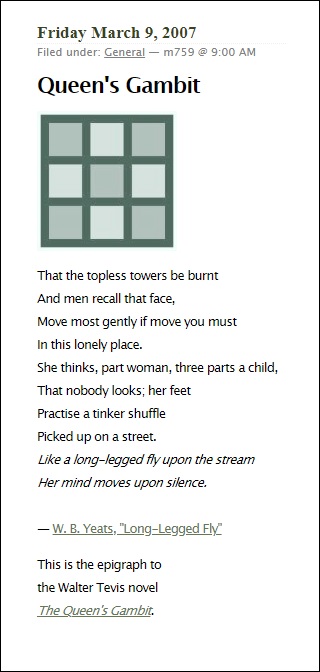Friday, January 15, 2021
The Shop on the Corner . . .
Reflection for a Forked Tongue
Reflection in the door of 794 Lexington Avenue,
New York City, November 2019 —

The object reflected —
To enlarge the image, click the above view of Lexington Ave. traffic.
Related narratives —
The life stories of “Germany’s oldest bookseller,” who reportedly died
around New Year’s 2021, and of her uncle, who had an art-book store
and gallery at 794 Lexington Avenue starting in 1923.
Tuesday, January 5, 2021
Epigraphy
The professor, Joshua Whatmough, in the previous post
taught, I later learned, something called epigraphy at Harvard.

An instance of the derived term "epigraph" —
The Shop on the Corner
George Steiner on chess —
"… the common bond between chess, music, and mathematics
may, finally, be the absence of language."
— George Steiner, Fields of Force: Fischer and Spassky at Reykjavik ,
Viking hardcover, June 1974.
In memory of George Steiner, of Walter Tevis, and of B&B Smoke Shop,
corner of Third Ave. and Liberty St., Warren, Pennsylvania, in the 1950s,
where I purchased . . .

At that point in my life, language interested me more than chess.
But I can identify with the protagonist of Walter Tevis's Queen's Gambit ,
(the book, not the film) who visited a similar smoke shop in 1960 —
… There was a long rack of magazines behind her. When she
got the cigarettes, she turned and began looking. Senator
Kennedy’s picture was on the cover of Time and Newsweek :
he was running for President . . . .
. . . Walking home with the folded [chess] magazine tucked
securely against her flat belly she thought again about that
rook move Morphy hadn’t made. The magazine said
Morphy was “perhaps the most brilliant player in the
history of the game.” The rook could come to bishop seven,
and Black had better not take it with his knight because…
She stopped, halfway down the block. A dog was barking
somewhere, and across the street from her on a well-mowed
lawn two small boys were loudly playing tag. After the
second pawn moved to king knight five, then the remaining
rook could slide over, and if the black player took
the pawn, the bishop could uncover, and if he didn’t…
She closed her eyes. If he didn’t capture it, Morphy
could force a mate in two, starting with the bishop sacrificing
itself with a check. If he did take it, the white pawn
moved again, and then the bishop went the other way
and there was nothing Black could do. There it was. One
of the little boys across the street began crying. There was
nothing Black could do. The game would be over in
twenty-nine moves at least. The way it was in the book, it
had taken Paul Morphy thirty-six moves to win. He
hadn’t seen the move with the rook. But she had.
Overhead the sun shone in a blank blue sky. The dog
continued barking. The child wailed. Beth walked slowly
home and replayed the game. Her mind was as lucid as a
perfect, stunning diamond.
***



